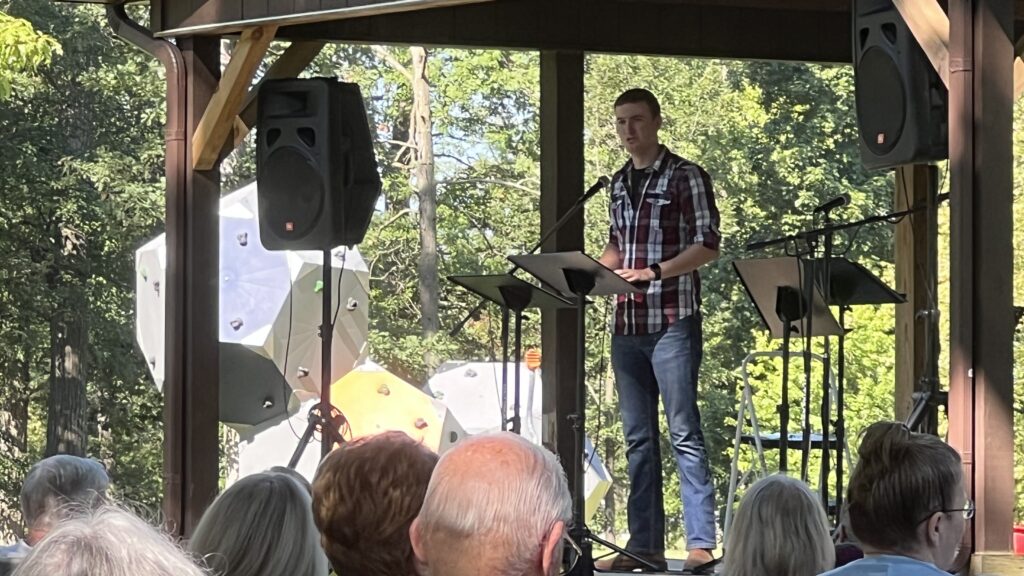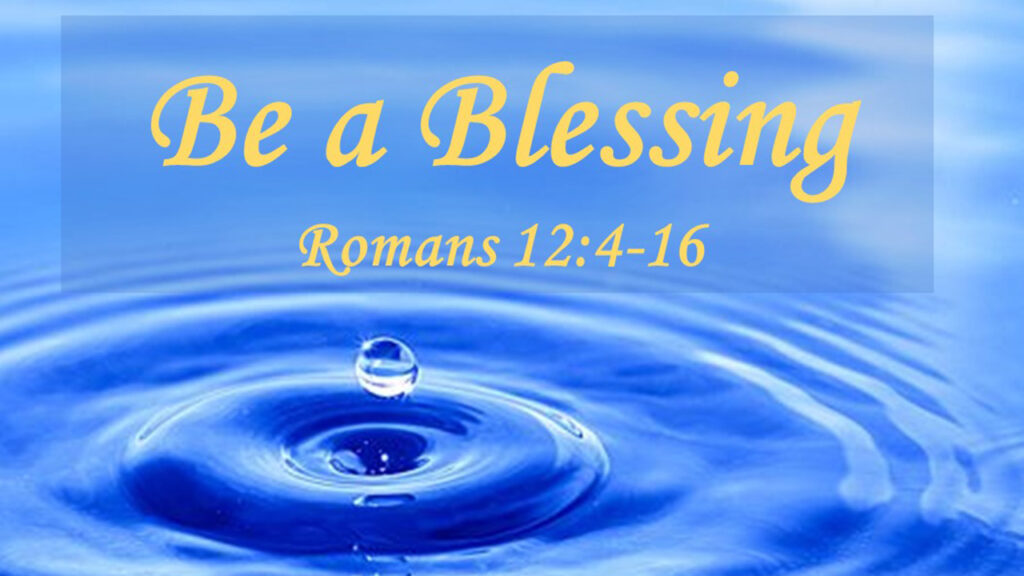
Be A Blessing
Posted on Aug 27, 2023 by Ken Durham in General, Sermon Notes, Special Message |

Be A Blessing
Romans 12:4-16; 1 Peter 3:8-11
A couple of weeks ago, Pastor Jerry spoke about Gideon and his need for a sign from God. I have to admit, my mind immediately chased a rabbit and went to “What if God used church signs to speak to us?” Let’s look at a few…
“Try these four-letter words: LOVE PRAY HOPE”
“If you don’t study the Bible, you won’t get the answer!”
“This too shall pass. It might pass like a kidney stone, but it’s gonna pass.”
“Our church is like fudge – sweet with a few nuts.”
“Forgive your enemies – it messes with their heads.”
“Kind words can be short and sweet, but their echoes are truly endless.”
All too often, we forget that our words carry a lot more weight than we give them credit. When we think of being a blessing, we tend to only think about tangible ways like giving someone money or meeting a need. But what about the blessing that all of us can give with our words? Not something just to pacify them, but to truly speak life over them and into their lives.
We are to be the Body of Christ, which means we have to all work together. That is why we all have been given different gifts. This makes it possible for us to be that Body.
ILLUS: Fold thumb over on both hands. Pick up Bible and turn to Romans 12
Thumbs have been given a bad rap. Have you ever heard “I’m all thumbs”? In the movie “Spy Kids” the Thumbkins were the bumbling henchman. We NEED our thumbs! They are the ones that help us to get a grip on things. “Okay, Ken, but I don’t feel like I am an important part of the body….I feel like I am the appendix.” Well, at first people thought it was a part that was no longer useful to the body, but now they are finding that it provides “good” bacteria for the intestines to help with digestion and our immune system. * So, while we could live without it, it serves a purpose. This is why every part of the body is important.
*https://www.verywellhealth.com/what-does-the-appendix-do-5270731
READ: Romans 12:4-16
Paul wrote these words to the people of Galatia and to us to remind us that we are to use our gifts selflessly, never for selfish gains, but in order to honor God and to see His blessings poured out on the whole body!
Peter has some similar words to say as he wrote to the people of Pontus, Galatia, Cappadocia, Asia, and Bithynia (which is now modern day Turkey)
READ: 1 Peter 3:8-11
What does that have to do with being a blessing? EVERYTHING!
We are all to be working together to build the kingdom of God for His glory and honor, not just for our own benefit. The late Rev. Dr. Jack Hyles, pastor of First Baptist Church in Hammond, IN once stated: “The greatest blessing in the whole world is being a blessing.” He was known for building one of the nations largest bus ministries that then led to opening schools and training resources to help minister to the needs of the church and community. God used his giftings and those of the people in the church to make a difference for both current and eternal needs.
So today we are going to give you scriptural answers to the following questions:
- Who is to be a blessing?
- When are we to be a blessing?
- How are we to be a blessing?
- Why are we to be a blessing?
Let us pray….
I. Who is to be a blessing?
1 Peter 3:8:
“Finally, all of you should be of one mind. Sympathize with each other. Love each other as brothers and sisters. Be tenderhearted, and keep a humble attitude.”
- Be of one mind (the body)
- Sympathize with each other
- Love each other as family
- Be tenderhearted with each other
- Keep a humble attitude toward each other.
II. When are we to be a blessing?
“Rejoice in our confident hope. Be patient in trouble, and keep on praying. When God’s people are in need, be ready to help them. Always be eager to practice hospitality.
- Rejoice always
- Be patient
- Keep praying
- Be ready to help
- Eager to practice hospitality
- Encourage each other
- Build each other up
ILLUS: George Mraz and weightlifting training.
III. How are we to be a blessing?
“In his grace, God has given us different gifts for doing certain things well. So if God has given you the ability to prophesy, speak out with as much faith as God has given you. If your gift is serving others, serve them well. If you are a teacher, teach well. If your gift is to encourage others, be encouraging. If it is giving, give generously. If God has given you leadership ability, take the responsibility seriously. And if you have a gift for showing kindness to others, do it gladly.”
- God has given each of us different gifts:
- Prophesy, speak the words God has given you.
- Serving, then serve others well
- Encouragement, then be encouraging
- Giving, then give generously
“When God blesses you financially, don’t raise your standard of living. Raise your standard of giving.” (Matt Batterson)
- Leadership, then take it seriously
- Showing kindness, then do it gladly
“Don’t just pretend to love others. Really love them. Hate what is wrong. Hold tightly to what is good. Love each other with genuine affection and take delight in honoring each other.”
- Can’t fake it till you make it!
- Not just for married couples.
- Really love and be genuine.
- Keep in mind what is good.
- Enjoy recognizing that love by honoring each other.
IV. Why are we to be a blessing?
- 1 Peter 3:9:
“Don’t repay evil for evil. Don’t retaliate with insults when people insult you. Instead, pay them back with a blessing. That is what God has called you to do, and he will grant you his blessing.”
- Don’t do what sinful nature leads you to do, but rather allow the Spirit to lead you to pay back with a blessing.
- Do what God has called you to do…and you will be blessed.
- Think about it this way…God did not add another day to your life because you needed it. He did it because someone out there needs you!
- When we serve others in love, we are showing our love for God in what we do and say.
Conclusion:
Today, I have given you the scriptural evidence that proves 1) Who is to be a blessing; 2) When we are to be a blessing; 3) How we are to be a blessing; and 4) Why we are to be a blessing. Imagine what our world would be like if we, as Christians, put this into practice as a “norm” for our lives. Peter quoted the Psalmist David in 1 Peter 3:10-11 (repeats Psalm 34:12-14) to give encouragement as to why we should live this way.
“For the Scriptures say, “If you want to enjoy life
and see many happy days, keep your tongue from speaking evil
and your lips from telling lies. Turn away from evil and do good.
Search for peace, and work to maintain it.”
So take this as your next challenge to help change the atmosphere of this world in which we live. Live on purpose to be a blessing.
Closing Blessing Prayer: EPHESIANS 1:16b-19a
“I pray for you constantly, asking God, the glorious Father of our Lord Jesus Christ, to give you spiritual wisdom and insight so that you might grow in your knowledge of God. I pray that your hearts will be flooded with light so that you can understand the confident hope he has given to those he called—his holy people who are his rich and glorious inheritance. I also pray that you will understand the incredible greatness of God’s power for us who believe him.”
You can watch the message by clicking HERE.
Read more...
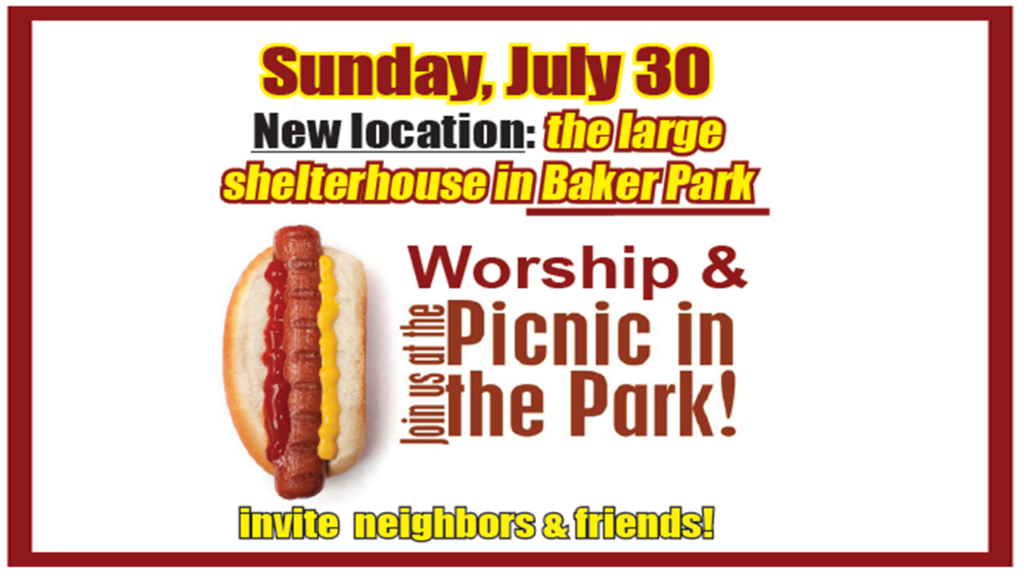
FBC Church Picnic
Posted on Jul 30, 2023 by admin in General, Sermon Notes, Special Message |

Sin, God’s Divine Mercy and Our Answer To It
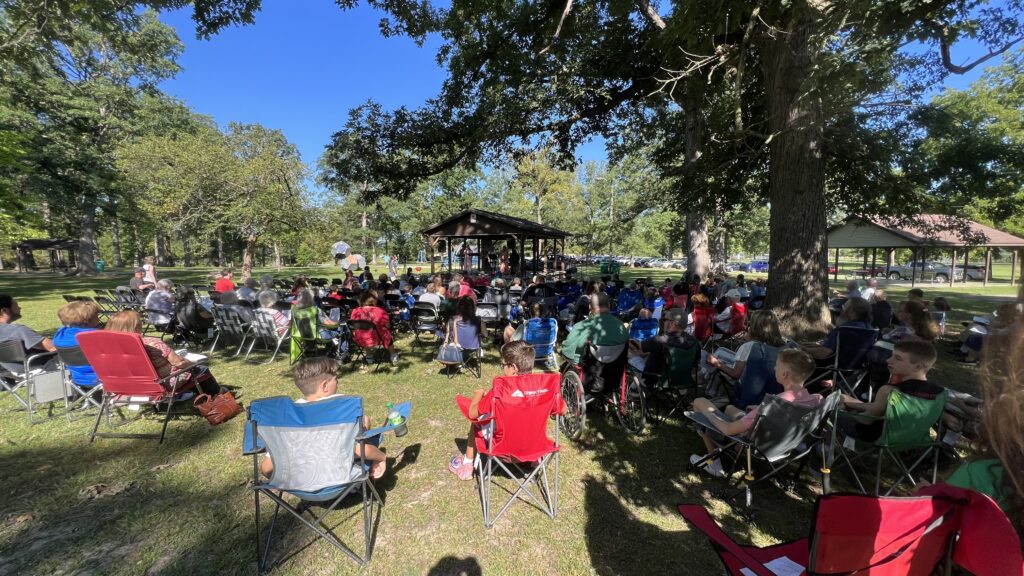
By Grace Through Faith
2 And you were dead in the trespasses and sins 2 in which you once walked, following the course of this world, following the prince of the power of the air, the spirit that is now at work in the sons of disobedience— 3 among whom we all once lived in the passions of our flesh, carrying out the desires of the body and the mind, and were by nature children of wrath, like the rest of mankind. 4 But God, being rich in mercy, because of the great love with which he loved us, 5 even when we were dead in our trespasses, made us alive together with Christ—by grace you have been saved— 6 and raised us up with him and seated us with him in the heavenly places in Christ Jesus, 7 so that in the coming ages he might show the immeasurable riches of his grace in kindness toward us in Christ Jesus. 8 For by grace you have been saved through faith. And this is not your own doing; it is the gift of God, 9 not a result of works, so that no one may boast. 10 For we are his workmanship, created in Christ Jesus for good works, which God prepared beforehand, that we should walk in them.
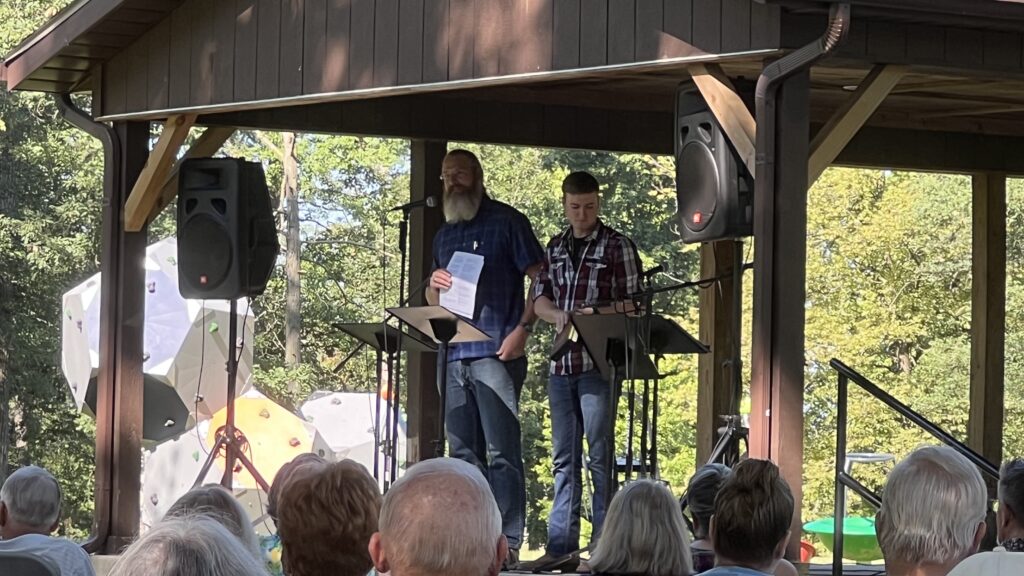
Outline of Message:
You can watch just the message by clicking HERE.
You can watch the entire worship service by clicking HERE.
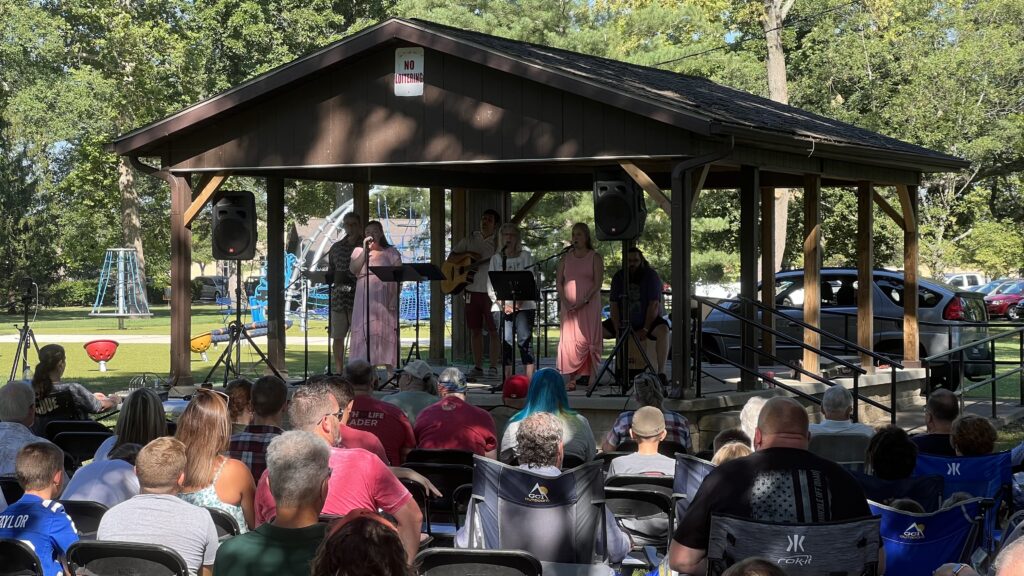
Read more...
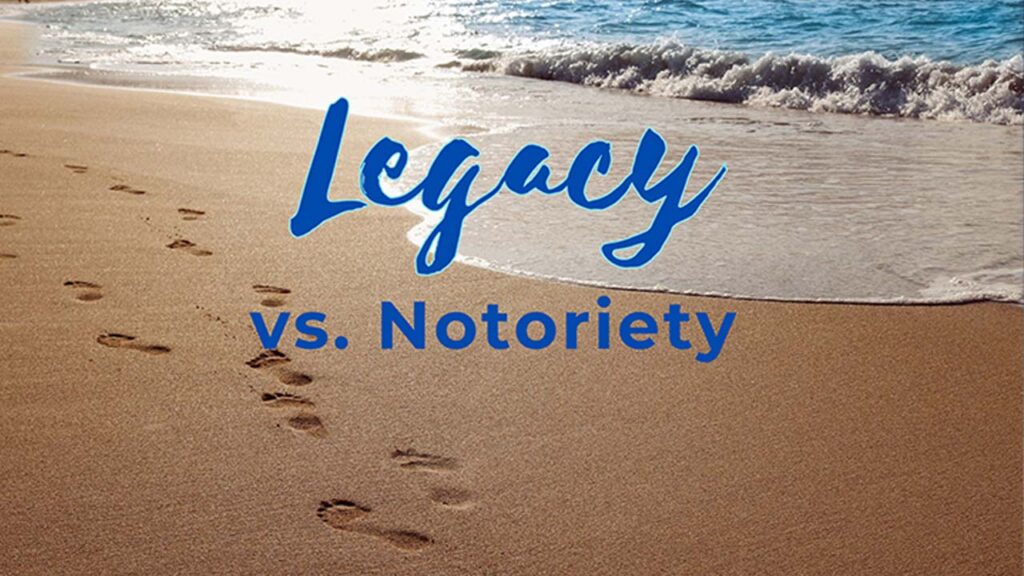
Legacy vs. Notoriety
Posted on Jul 23, 2023 by Ken Durham in General, Sermon Notes, Special Message |

Legacy vs. Notoriety
INTRODUCTION:
With all the modern technology that we have today, it is easy to see how a person could become famous overnight. They could easily gain notoriety, but all too often become notorious. They also have a choice to become a legend or leave a legacy.
When you get notoriety, the documentation starts that puts into words the type of person you are. And depending on who is writing the story will depict how much of it is fact or if it is fabrication to make the story more interesting. (Look at all the stories in the tabloids)
The problem with becoming a legend is once again the stories may have been ‘enhanced’ to make them more exciting. The dictionary defines a legend as “a story coming down from the past, especially one popularly regarded as historical although not verifiable.”
Since Pastor Jerry has started this new series based on Hebrews 11, we have seen those in the Bible whom the world would call notorious and legendary. But we know them to be notable for leaving a legacy. A legacy is defined as “something transmitted by or received from an ancestor or from the past.” This Faithful Hall of Fame roster shows us men and women who were by no means perfect, but rather chose to live a life of faithfulness to God, leaving a legacy for us to see today.
or the time he got drunk and his sons found him naked?
becoming the “father and mother” of a nation,
or the time they lied to a King about their relationship?
The list could go on and on from other examples in the Bible, but I want to bring this to how it applies to us today. While our names may not appear in the holy scriptures, we are told multiple times that we are to live out our lives to bring glory to God in all we say and do.
Psalm 112:1-2
Praise the Lord! How joyful are those who fear the Lord and delight in obeying his commands. Their children will be successful everywhere; an entire generation of godly people will be blessed.
We are given the strategy for a life of legacy right here in this Psalm. But this is not something that comes naturally to us. We must put God first in every area of our lives.
That can be accomplished by doing the following:
- Cultivate the soil of our hearts: by delighting in God’s Word and His commands. (Psalm 1:1-3; Psalm 37:4-5)
- Sow good seeds into the lives of our families and others: with our testimonies. (Psalm 78:4; Psalm 145:4-7)
- Care for the crop of our future legacy: with proper instruction and setting the example by serving and blessing others. (Deut. 6:5-7; Philippians 4:9; 1 Peter 4:10)
- Reap a harvest of blessing: for generations to come. (Psalm 78:6-7)
Legacy building begins when we:
Psalm 1:1-3
Oh, the joys of those who do not follow the advice of the wicked, or stand around with sinners, or join in with mockers. But they delight in the law of the Lord, meditating on it day and night. They are like trees planted along the riverbank, bearing fruit each season. Their leaves never wither, and they prosper in all they do.
- Keep Christian music playing all day.
- Start and end your day by reading a scripture, maybe even memorizing it.
- Share with family or someone else how God had encouraged you that day.
Psalm 37:4-5
Take delight in the Lord, and he will give you your heart’s desires. Commit everything you do to the Lord. Trust him, and he will help you.
- No longer selfish “what we want”
- We find new found freedom as we fully trust in the Lord.
Psalm 78:4
We will not hide these truths from our children; we will tell the next generation about the glorious deeds of the Lord, about his power and his mighty wonders.
- Consider keeping a journal for both you and others to read.
- Send out a text, email or notecard to family and friends of what God had been doing in your life.
- Give a testimony in church of how God has been transforming your story.
Psalm 145:4-7
Let each generation tell its children of your mighty acts; let them proclaim your power. I will meditate on your majestic, glorious splendor and your wonderful miracles. Your awe-inspiring deeds will be on every tongue; I will proclaim your greatness. Everyone will share the story of your wonderful goodness; they will sing with joy about your righteousness.
- Share the story..be a storykeeper.
- Sing with joy (testimony in song) and praise Him forever!
Deuteronomy 6:5-7
And you must love the Lord your God with all your heart, all your soul, and all your strength. And you must commit yourselves wholeheartedly to these commands that I am giving you today. Repeat them again and again to your children. Talk about them when you are at home and when you are on the road, when you are going to bed and when you are getting up.
- Words matter, because they reveal what’s in your heart.
- Along with teaching the truths of God, you need to use and live these words as well:
- I Love You (John 15:9)
- I Am Sorry (James 5:16)
- I Forgive You (Colossians 3:13)
*Forgiveness is more about freeing yourself that it is about freeing others.
Philippians 4:9
Keep putting into practice all you learned and received from me—everything you heard from me and saw me doing. Then the God of peace will be with you.
1 Peter 4:10
God has given each of you a gift from his great variety of spiritual gifts. Use them well to serve one another.
- This is the example that Jesus gave us
- He told the disciples
- He showed the disciples
- He had them go out in pairs and practice then come back with a report
- He sent them out with the power of the Holy Spirit.
- We are all to use our gifts to serve others
What is the outcome?
Psalm 78:6-7
So the next generation might know them—even the children not yet born—and they in turn will teach their own children. So each generation should set its hope anew on God, not forgetting his glorious miracles and obeying his commands.
Conclusion:
You can watch this message by clicking HERE.
Read more...
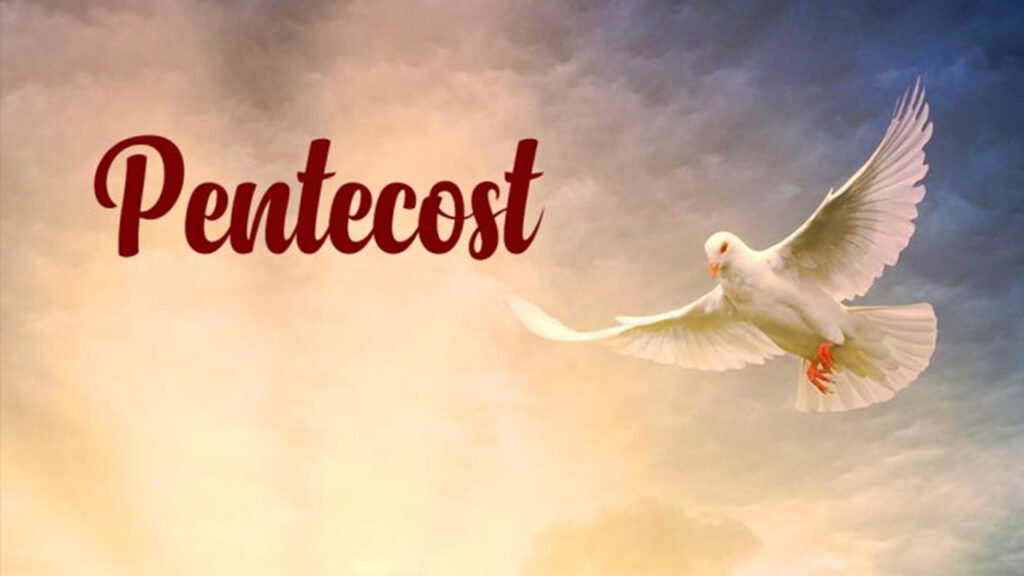
Pentecost Sunday 2023
Posted on May 28, 2023 by Jerry Ingalls in General, Sermon Notes, Special Message |

What is Pentecost?
1. We are adopted!
2. We are sealed!
3. We are transformed!
The Apprentice Prayer
Jesus, I love you! Father, I adore you! Holy Spirit, I rely on you!Lord Jesus, I seek to live as your apprentice in all that I do today. My life is your school for teaching me. I relinquish my agenda for this day and I submit myself to you and your kingdom purposes. In all situations today I pray, “Your will, your way, your time.”
Dear Father, I ask you to ordain the events of this day and use them to make me more like Jesus. I trust you, Sovereign Lord, that you won’t let anything happen to my family or me today, except that it passes through your loving hands. So no matter what problems, hardships, or injustices I face today help me not to worry or get frustrated, but instead to relax in the yoke of your providence. Yes, today I will rejoice because I am in your eternal kingdom, you love me, and you are teaching me!
My Lord, I devote my whole self to you. I want to be all and only for Jesus! Today, I seek to love you with all my heart, all my soul, all my mind, all my strength, and all my relationships.
Today, I depend on you, Holy Spirit, not my own resources. Help me to keep in step with you.
Today, I look to love others as you love me, dear God, blessing everyone I meet, even those who mistreat me.
Today, I’m ready to lead people to follow you, Jesus.
Amen.
You can watch this service by clicking HERE.
Read more...
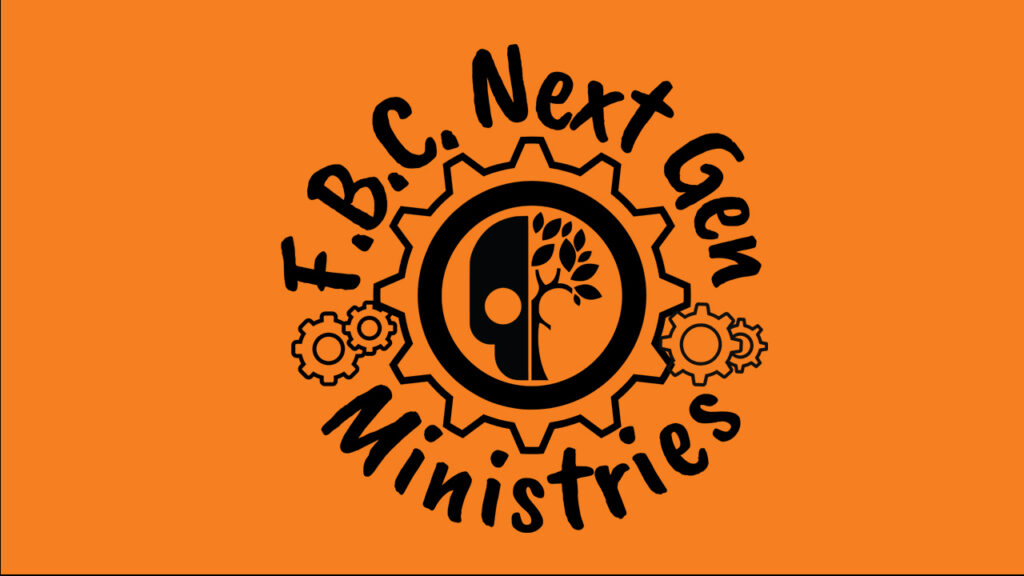
Next Gen Ministries
Posted on May 21, 2023 by Kevin King in General, Sermon Notes, Special Message |

Graduation Video
The Kidz Zone: Time Machine

A video about the Time Machine ((0:30)
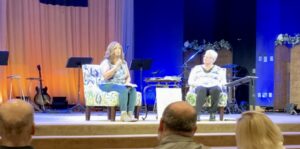
Q & A with Cindi (6:45)
Children’s Ministry (15:00)
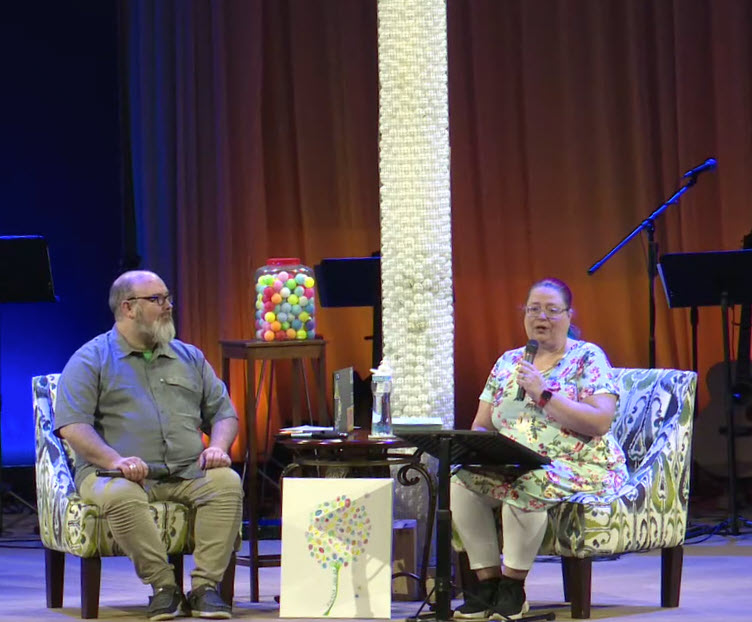
AWANA
Youth Ministry (29:50)
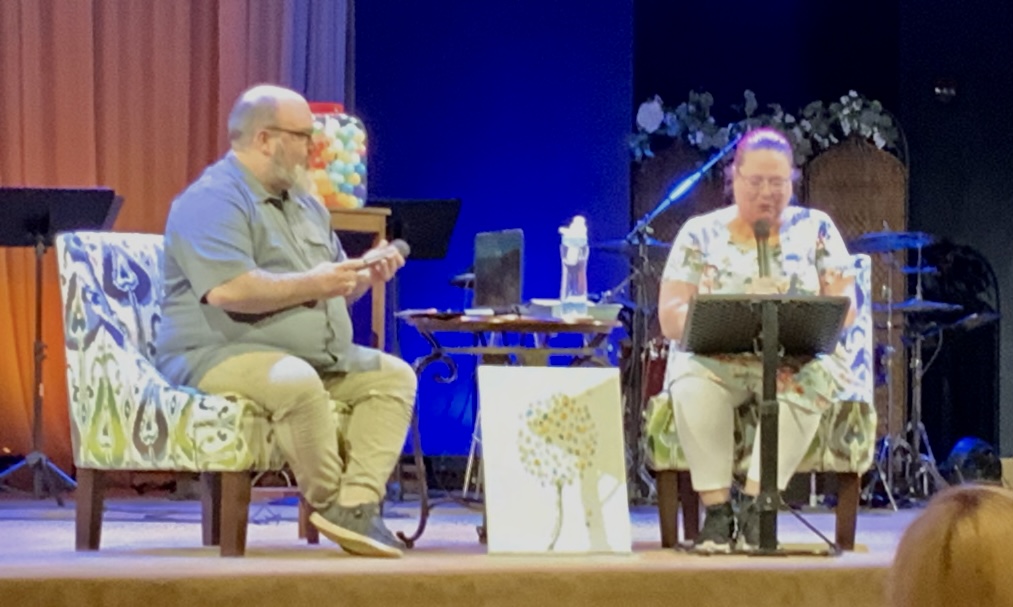
Leading By Example
The Orange Method
You can watch this video by clicking HERE.
Read more...
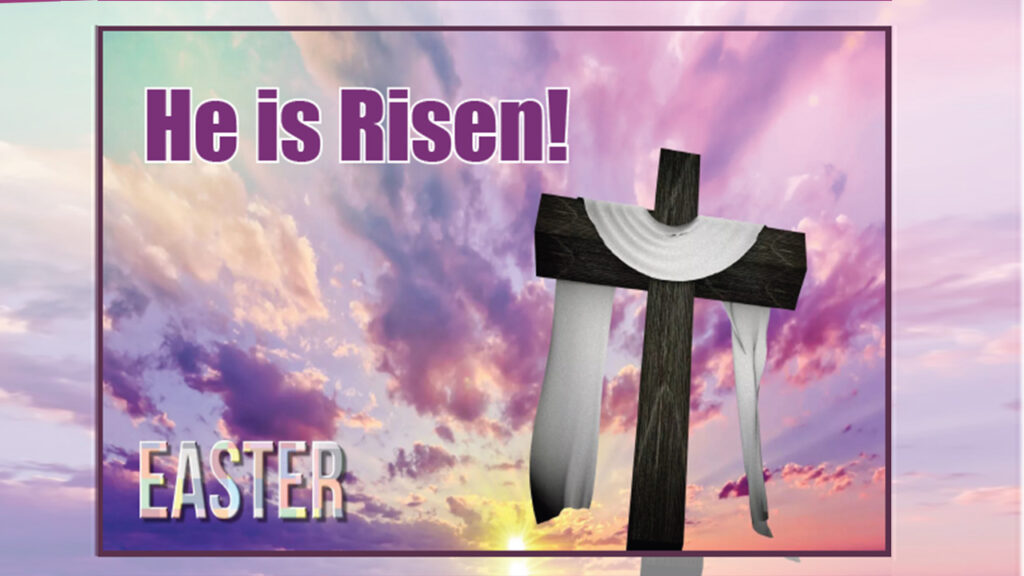
Easter Sunday 2023
Posted on Apr 9, 2023 by Jerry Ingalls in General, Sermon Notes, Special Message |

The Easter Proclamation!
Luke 24:1-7 & John 11:25-26 (NAS95)
But on the first day of the week, at early dawn, they came to the tomb bringing the spices which they had prepared. And they found the stone rolled away from the tomb, but when they entered, they did not find the body of the Lord Jesus. While they were perplexed about this, behold, two men suddenly stood near them in dazzling clothing; and as the women were terrified and bowed their faces to the ground, the men said to them, “Why do you seek the living One among the dead? “He is not here, but He has risen. Remember how He spoke to you while He was still in Galilee, saying that the Son of Man must be delivered into the hands of sinful men, and be crucified, and the third day rise again.”
Let us pray.
Before Easter Sunday, Jesus promised in John 11:25-26, “I am the resurrection and the life; he who believes in Me will live even if he dies, and everyone who lives and believes in Me will never die. Do you believe this?” The resurrection of Jesus Christ is our hope, not only for eternal life, but for today. In Romans 5:1-5, Paul taught us that this hope comes from Jesus’ death and resurrection:
Therefore, having been justified by faith, we have peace with God through our Lord Jesus Christ, through whom also we have obtained our introduction by faith into this grace in which we stand; and we exult in hope of the glory of God. And not only this, but we also exult in our tribulations, knowing that tribulation brings about perseverance; and perseverance, proven character; and proven character, hope; and hope does not disappoint, because the love of God has been poured out within our hearts through the Holy Spirit who was given to us.
I don’t know about you, but I have had periods of hopelessness in my life, and those seasons have been dark and dangerous at times. I have found it to be a critical part of my faith to train the hope of the resurrection into my bones. It’s not enough to know about it and affirm it once a year on Easter Sunday; to experience its victory in your everyday life, you must believe and trust it with every ounce of your being, as if your very life depended on it. I invite you today, on Easter Sunday, to anchor yourself – heart, mind, body, and soul – to the hope we have from Jesus Christ’s victory. As Hebrews 6:19 teaches us to do, “This hope we have as an anchor of the soul, a hope both sure and steadfast and one which enters within the veil.”
Hope is not wishful thinking – Christian hope is the certainty of the resurrection and life of Jesus Christ, which provides you stability during the trials and tribulations of today. It is an anchor when storms come, and they will come when we you least expect them to come! We need to find stability in something greater than ourselves – the victory of Jesus Christ who has overcome death! John stated this in 1 John 5:4-5, “For whatever is born of God overcomes the world; and this is the victory that has overcome the world—our faith. Who is the one who overcomes the world, but he who believes that Jesus is the Son of God?” You can have hope in your most difficult circumstances, moments filled with hopelessness and situations marked by despair because Jesus lives – He has overcome! Paul taught us in 1 Corinthians 15:20-26:
But now Christ has been raised from the dead, the first fruits of those who are asleep. For since by a man came death, by a man also came the resurrection of the dead. For as in Adam all die, so also in Christ all will be made alive. But each in his own order: Christ the first fruits, after that those who are Christ’s at His coming, then comes the end, when He hands over the kingdom to the God and Father, when He has abolished all rule and all authority and power. For He must reign until He has put all His enemies under His feet. The last enemy that will be abolished is death.
While there is still sickness and death in this world, Jesus says that this sin-sick world will not end in death, but all things will be made new for the glory of God. He proclaimed this in Revelation 21:3-5:
“Behold, the tabernacle of God is among men, and He will dwell among them, and they shall be His people, and God Himself will be among them, and He will wipe away every tear from their eyes; and there will no longer be any death; there will no longer be any mourning, or crying, or pain; the first things have passed away.” And He who sits on the throne said, “Behold, I am making all things new.’ And He said, ‘Write, for these words are faithful and true.”
We must believe our own Easter story in our everyday lives – Jesus is making all things new! Don’t forget – grip tight to that which we believe! God commands us to live out the implications of the promise of the resurrection and life in our everyday lives: to unbind the captives, set free the oppressed, give sight to the blind, and preach the gospel in word and deed. We see this in Jesus’ miracle of resuscitating Lazarus in in John 11:39-44:
Jesus said, “Remove the stone.” Martha, the sister of the deceased, said to Him, “Lord, by this time there will be a stench, for he has been dead four days.” Jesus said to her, “Did I not say to you that if you believe, you will see the glory of God?” So they removed the stone. Then Jesus raised His eyes, and said, “Father, I thank You that You have heard Me. I knew that You always hear Me; but because of the people standing around I said it, so that they may believe that You sent Me.” When He had said these things, He cried out with a loud voice, “Lazarus, come forth.” The man who had died came forth, bound hand and foot with wrappings, and his face was wrapped around with a cloth. Jesus said to them, “Unbind him, and let him go.”
This is our work to do today: to “unbind [them], and let [them] go,” just as God, in Christ Jesus, has set each of us free! Jesus said in John 8:36, “So if the Son makes you free, you will be free indeed.” We must encourage and embolden one another with the hope of the resurrection! Paul taught us this in 1 Thessalonians 4:13-15:
“But we do not want you to be uninformed, brethren, about those who are asleep, so that you will not grieve as do the rest who have no hope. For if we believe that Jesus died and rose again, even so God will bring with Him those who have fallen asleep in Jesus. For this we say to you by the word of the Lord, that we who are alive and remain until the coming of the Lord, will not precede those who have fallen asleep.”
We all need courage and comfort in these dark days. The resurrection of Jesus Christ, just like the final victory revealed to us in the New Heaven and New Earth, is given to us to give us hope when hope feels forlorn. Have courage, and face your day, knowing the victory is won – there is hope! There is a certainty of that which cannot be seen – there is the promise of resurrection and life!
To solidify today’s message, we are going to do two things in response: 1) we are going to make a declaration of our faith. 2) We are going to participate in communion together a sign of our unity in Christ’s Victory!
Therefore, hear the Word of God for the church of Jesus Christ from 1 Corinthians 15:50-58:
Now I say this, brethren, that flesh and blood cannot inherit the kingdom of God; nor does the perishable inherit the imperishable. Behold, I tell you a mystery; we will not all sleep, but we will all be changed, in a moment, in the twinkling of an eye, at the last trumpet; for the trumpet will sound, and the dead will be raised imperishable, and we will be changed. For this perishable must put on the imperishable, and this mortal must put on immortality. But when this perishable will have put on the imperishable, and this mortal will have put on immortality, then will come about the saying that is written, “Death is swallowed up in victory. “O death, where is your victory? O death, where is your sting?” The sting of death is sin, and the power of sin is the law; but thanks be to God, who gives us the victory through our Lord Jesus Christ. Therefore, my beloved brethren, be steadfast, immovable, always abounding in the work of the Lord, knowing that your toil is not in vain in the Lord.
Beloved church of Jesus Christ, my brethren, we come to the Lord’s Table on this Easter Sunday as a declaration that God has given us the victory through our Lord Jesus Christ, the Savior of the World. The victory of God is the defeat over the evil forces of hell, of sin, and of the final enemy, death. Paul declared in Colossians 3:12-15:
When you were dead in your transgressions and the uncircumcision of your flesh, He made you alive together with Him, having forgiven us all our transgressions, having canceled out the certificate of debt consisting of decrees against us, which was hostile to us; and He has taken it out of the way, having nailed it to the cross. When He had disarmed the rulers and authorities, He made a public display of them, having triumphed over them through Him.
Jesus declared in Revelation 1:17-18, “Do not be afraid; I am the first and the last, and the living One; and I was dead, and behold, I am alive forevermore, and I have the keys of death and of Hades.”
- Do you believe in Jesus the Christ, the Son of God, who took your death on the Cross of Calvary, which every person deserves as the wages for sin, so that you may experience forgiveness for sin through the sufficiency of God’s grace?
- Do you believe that Jesus Christ, defeated death, experiencing the resurrection from the dead after three days in the grave, revealed himself in His resurrected body to His followers for forty days, and is now ascended to the right hand of God where He intercedes for you today?
- Do you believe that God loves you and has chosen to make His dwelling place in you through the indwelling of the Holy Spirit, who has sealed you for the day of redemption?
- Do you believe that even now you have eternal life through the precious blood of Jesus Christ and that nothing can separate you from the love of God, which is in Christ Jesus our Lord, neither death, nor life, nor angels, nor principalities, nor things present, nor things to come, nor powers, nor height, nor depth, nor any other created thing?
- Do you believe that Jesus Christ will come again, soon, to bring His people to Himself and restore justice to the nations through His iron rod of judgment?
- Do you believe that on the Day of the Lord, Jesus Christ will make all things new and restore on the earth the dwelling place of God with humanity, in the New Heaven and New Earth?
This is our faith, and this is our victory, bestowed upon us through the love of God in Jesus Christ! Faith, according to Hebrews 11:1 is “the assurance of things hoped for, the conviction of things not seen.” It is our faith in the life, death, resurrection, ascension, and imminent return of Jesus Christ that is our victory because it is through faith that we take on the life of God through the forgiveness of our sins and the indwelling of His Holy Spirit.
As a regular practice of our faith and as a proclamation of our unity as the people of God, we declare the victory of God through the partaking of the elements of the Lord’s Supper – the bread represents His body, and the cup of the New Covenant symbolizes His blood. Our participation in this commemoration meal causes us to yearn for the abundance of the great wedding feast we will enjoy together in the very presence of Jesus Christ in Heaven—our union with Him and reunion with those who are in Him throughout all time.
Hear now the words of institution over the elements of this ancient ordinance of the church, as given to us by Paul in 1 Corinthians 11:23-33:
For I received from the Lord that which I also delivered to you, that the Lord Jesus in the night in which He was betrayed took bread; and when He had given thanks, He broke it and said, “This is My body, which is for you; do this in remembrance of Me.” In the same way He took the cup also after supper, saying, “This cup is the new covenant in My blood; do this, as often as you drink it, in remembrance of Me.” For as often as you eat this bread and drink the cup, you proclaim the Lord’s death until He comes. Therefore whoever eats the bread or drinks the cup of the Lord in an unworthy manner, shall be guilty of the body and the blood of the Lord. But a man must examine himself, and in so doing he is to eat of the bread and drink of the cup. For he who eats and drinks, eats and drinks judgment to himself if he does not judge the body rightly. For this reason many among you are weak and sick, and a number sleep. But if we judged ourselves rightly, we would not be judged. But when we are judged, we are disciplined by the Lord so that we will not be condemned along with the world. So then, my brethren, when you come together to eat, wait for one another.
Prayer of examen
Let us, the one body of Christ, in concert with the church of Jesus Christ throughout the world and throughout time, partake of the elements together as a sign of our unity:
- His body broken for you…
- His blood shed for the forgiveness of your sin…
This is the eternal covenant of God with humanity, which is for the forgiveness of your sin and the eternal union of your soul with God. May God have mercy on His people and may you find rest for your soul in the easy yoke of Jesus Christ. May this partaking of the Lord’s Supper remind you of your baptismal vows to God and your forsaking of the devil, the flesh, and of the world. The Cross before you, the world behind you, no turning back! Empowered by the Holy Spirit, through the grace of God, may you live the life of faith – to declare the victory of Jesus Christ through His resurrection from the dead!
Allow me to pray over you the words of the Apostle Paul from Ephesians 4:1-6 & 1 Corinthians 15:58:
Therefore I, the prisoner of the Lord, implore you to walk in a manner worthy of the calling with which you have been called, with all humility and gentleness, with patience, showing tolerance for one another in love, being diligent to preserve the unity of the Spirit in the bond of peace. There is one body and one Spirit, just as also you were called in one hope of your calling; one Lord, one faith, one baptism, one God and Father of all who is over all and through all and in all. … Therefore, my beloved brethren, be steadfast, immovable, always abounding in the work of the Lord, knowing that your toil is not in vain in the Lord.
I dedicate you to Jesus Christ and His righteousness and may all your days left upon this earth be in the service to the King of kings and His eternal kingdom. In the name of the Father and of the Son and of the Holy Spirit. Amen.
You can watch this message by clicking HERE.
Read more...
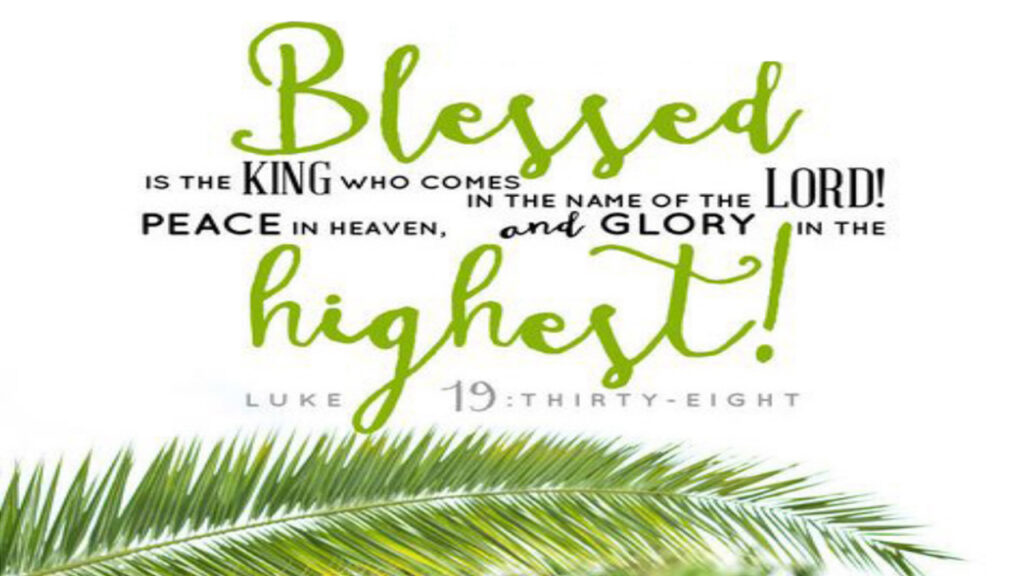
Palm Sunday 2023
Posted on Apr 2, 2023 by Jerry Ingalls in General, Sermon Notes, Special Message |

Cry out in Praise!
Luke 19:28-40 (NAS95)
Today, we gather to commemorate Palm Sunday and the beginning of the Passion Week. During this holy week of remembrance we will gather five times – today, Thursday night to remember the night Jesus was betrayed, Friday night on Good Friday to remember the crucifixion of Jesus Christ, at sunrise on Easter Sunday to declare the tomb is empty, and for our Celebration of the Resurrection service at our normal time next week to praise God for our salvation through Jesus’ life, death, and resurrection. We do all of this to remember what Christ has done for us.
It is for this reason we come to the Lord’s Table today – to remember. First, I am going to read the words of institution given to us by Paul in 1 Corinthians 11:23-28. After I read, we will take a moment of silence to pray and examine ourselves, as instructed by Scripture, then I will lead us in partaking of the elements. Listen now to the words of institution:
For I received from the Lord that which I also delivered to you, that the Lord Jesus in the night in which He was betrayed took bread; and when He had given thanks, He broke it and said, “This is My body, which is for you; do this in remembrance of Me.” In the same way He took the cup also after supper, saying, “This cup is the new covenant in My blood; do this, as often as you drink it, in remembrance of Me.” For as often as you eat this bread and drink the cup, you proclaim the Lord’s death until He comes. Therefore whoever eats the bread or drinks the cup of the Lord in an unworthy manner, shall be guilty of the body and the blood of the Lord. But a man must examine himself, and in so doing he is to eat of the bread and drink of the cup.
The Word of the Lord. I invite you into a time of moment of silence to pray and examine yourselves – receive afresh the grace of God for the healing of our souls and the strengthening of our bodies through the ancient rite of the church, given to us by Jesus Christ on the night He was betrayed.
[Moment of Silence followed by the partaking of the elements]
[The bread] Take this, all of you, and eat of it: the body of Christ, broken for you.
[The cup] Take this, all of you, and drink from it: this is the cup of the new and everlasting covenant. Christ’ blood shed for you, and for all who believe, for the forgiveness of sins. Do this in memory of me.
Prayer
[Transition to Scripture reading] Daniel & Katie Kinnaird are going to read to us from Luke 19:28-40, the Triumphal Entry of Jesus Christ into Jerusalem to begin the Passion Week:
After He had said these things, He was going on ahead, going up to Jerusalem. When He approached Bethphage and Bethany, near the mount that is called Olivet, He sent two of the disciples, saying, “Go into the village ahead of you; there, as you enter, you will find a colt tied on which no one yet has ever sat; untie it and bring it here. “If anyone asks you, ‘Why are you untying it?’ you shall say, ‘The Lord has need of it.’ ” So those who were sent went away and found it just as He had told them. As they were untying the colt, its owners said to them, “Why are you untying the colt?” They said, “The Lord has need of it.” They brought it to Jesus, and they threw their coats on the colt and put Jesus on it. As He was going, they were spreading their coats on the road. As soon as He was approaching, near the descent of the Mount of Olives, the whole crowd of the disciples began to praise God joyfully with a loud voice for all the miracles which they had seen, shouting: “Blessed is the King who comes in the name of the Lord; Peace in heaven and glory in the highest!” Some of the Pharisees in the crowd said to Him, “Teacher, rebuke Your disciples.” But Jesus answered, “I tell you, if these become silent, the stones will cry out!” When He approached Jerusalem, He saw the city and wept over it, saying, “If you had known in this day, even you, the things which make for peace! But now they have been hidden from your eyes. “For the days will come upon you when your enemies will throw up a barricade against you, and surround you and hem you in on every side, and they will level you to the ground and your children within you, and they will not leave in you one stone upon another, because you did not recognize the time of your visitation.”
[Daniel & Katie share as the Lord leads them, then pray and release the kids to Children’s Church]
We are in the middle of a sermon series about the strategy of a faithful farmer. The focus of a hardworking farmer is to yield a large crop yield, a bountiful harvest. C. H. Spurgeon preached in 1871, “Preaching is sowing, prayer is watering, but praise is the harvest.”[1]
Today’s Palm Sunday message is called, “Cry out in Praise” because the harvest of Jesus’ triumphal entry was praise! When the religious leaders asked Jesus to rebuke His disciples for praising Him as the coming Messiah and King, Jesus answered, “I tell you, if these become silent, the stones will cry out!” The very creation will declare the glory of God!
Their praise was coming from Psalm 118, which is why the Pharisees were so scandalized. Listen to Pastor James Montgomery Boice explain the significance of what was happening:
When we remember that Psalm 118 is part of the Egyptian Hallel [Hallel means “praise” – Psalms 113-118 are called the Hallel Psalms], that the Hallel was sung by Jews at the time of the Passover, and that it was Passover when Jesus entered Jerusalem and later died on Calvary, it is understandable that these words would have been in the minds of the people who greeted him as he entered the city. Jesus entered Jerusalem on the day the lambs were being taken into the Jewish homes in preparation for the sacrifice. Did the people understand that Jesus was the Son of God and that he was coming to give his life as a ransom to save his people from their sins? No, though some, like Mary of Bethany, seem to have known that he was about to die (see John 12:7). Whether the masses understood it or not, these verses describe what Jesus was doing and was about to do. He had indeed come “in the name of the Lord” to do the will of his Father in heaven, and what he had been sent to do was “save” his people from their sins. He would do it by dying.[2]
Listen now to Psalm 118, part of the Hallel, from which the disciples praised God during Jesus’ triumphal entry:
Give thanks to the Lord, for He is good; For His lovingkindness is everlasting. Oh let Israel say, “His lovingkindness is everlasting.” Oh let the house of Aaron say, “His lovingkindness is everlasting.” Oh let those who fear the Lord say, “His lovingkindness is everlasting.” From my distress I called upon the Lord; The Lord answered me and set me in a large place. The Lord is for me; I will not fear; What can man do to me? The Lord is for me among those who help me; Therefore I will look with satisfaction on those who hate me. It is better to take refuge in the Lord Than to trust in man. It is better to take refuge in the Lord Than to trust in princes. All nations surrounded me; In the name of the Lord I will surely cut them off. They surrounded me, yes, they surrounded me; In the name of the Lord I will surely cut them off. They surrounded me like bees; They were extinguished as a fire of thorns; In the name of the Lord I will surely cut them off. You pushed me violently so that I was falling, But the Lord helped me. The Lord is my strength and song, And He has become my salvation. The sound of joyful shouting and salvation is in the tents of the righteous; The right hand of the Lord does valiantly. The right hand of the Lord is exalted; The right hand of the Lord does valiantly. I will not die, but live, And tell of the works of the Lord. The Lord has disciplined me severely, But He has not given me over to death. Open to me the gates of righteousness; I shall enter through them, I shall give thanks to the Lord. This is the gate of the Lord; The righteous will enter through it. I shall give thanks to You, for You have answered me, And You have become my salvation. The stone which the builders rejected Has become the chief corner stone. This is the Lord’s doing; It is marvelous in our eyes. This is the day which the Lord has made; Let us rejoice and be glad in it. O Lord, do save, we beseech You; O Lord, we beseech You, do send prosperity! Blessed is the one who comes in the name of the Lord; We have blessed you from the house of the Lord. The Lord is God, and He has given us light; Bind the festival sacrifice with cords to the horns of the altar. You are my God, and I give thanks to You; You are my God, I extol You. Give thanks to the Lord, for He is good; For His lovingkindness is everlasting.
The “Hosanna” is proclaimed in verse 25, “O LORD, DO SAVE, WE BESEECH YOU”!
Verse 26 is proclaimed by the crowd, “BLESSED IS THE ONE WHO COMES IN THE NAME OF THE LORD”!
Unknown to the people, Jesus is the “festival sacrifice” of verse 27, “BIND THE FESTIVAL SACRIFICE WITH CORDS TO THE HORNS OF THE ALTAR.” Jesus is the perfect Passover Lamb, the final atoning sacrifice for our sins. Peter proclaimed this in 1 Peter 1:18-19, “you were not redeemed with perishable things like silver or gold from your futile way of life inherited from your forefathers, but with precious blood, as of a lamb unblemished and spotless, the blood of Christ.”
Jesus is the “CHIEF CORNER STONE” of verse 22 – “THE STONE WHICH THE BUILDERS REJECTED”! Listen to how Peter proclaimed this truth in Acts 4:8-12:
Then Peter, filled with the Holy Spirit, said to them, “Rulers and elders of the people, if we are on trial today for a benefit done to a sick man, as to how this man has been made well, let it be known to all of you and to all the people of Israel, that by the name of Jesus Christ the Nazarene, whom you crucified, whom God raised from the dead—by this name this man stands here before you in good health. “He is the stone which was rejected by you, the builders, but which became the chief corner stone. “And there is salvation in no one else; for there is no other name under heaven that has been given among men by which we must be saved.”
If Jesus is the chief corner stone, then what are we to do with our lives? Peter answers that question for us in 1 Peter 2:4-12:
And coming to Him as to a living stone which has been rejected by men, but is choice and precious in the sight of God, you also, as living stones, are being built up as a spiritual house for a holy priesthood, to offer up spiritual sacrifices acceptable to God through Jesus Christ. For this is contained in Scripture: “Behold, I lay in Zion a choice stone, a precious corner stone, And he who believes in Him will not be disappointed.” This precious value, then, is for you who believe; but for those who disbelieve, “The stone which the builders rejected, This became the very corner stone,” and, “A stone of stumbling and a rock of offense”; for they stumble because they are disobedient to the word, and to this doom they were also appointed. But you are a chosen race, a royal priesthood, a holy nation, a people for God’s own possession, so that you may proclaim the excellencies of Him who has called you out of darkness into His marvelous light; for you once were not a people, but now you are the people of God; you had not received mercy, but now you have received mercy. Beloved, I urge you as aliens and strangers to abstain from fleshly lusts which wage war against the soul. Keep your behavior excellent among the Gentiles, so that in the thing in which they slander you as evildoers, they may because of your good deeds, as they observe them, glorify God in the day of visitation.
This is your calling – to proclaim the excellencies of Him who has called you out of darkness into His marvelous light! You are now the light of the World through the shed blood of Jesus Christ – the perfect Passover Lamb who entered Jerusalem on the very day the lambs were being taken into the Jewish homes in preparation for the sacrifice. Psalm 118:26-29 concludes:
Blessed is the one who comes in the name of the Lord; We have blessed you from the house of the Lord. The Lord is God, and He has given us light; Bind the festival sacrifice with cords to the horns of the altar. You are my God, and I give thanks to You; You are my God, I extol You. Give thanks to the Lord, for He is good; For His lovingkindness is everlasting.
You can watch this message by clicking HERE.
FOOTNOTES:
[1] C. H. Spurgeon, “The Joy of the Lord, the Strength of His People,” in The Metropolitan Tabernacle Pulpit Sermons, vol. 17 (London: Passmore & Alabaster, 1871), 717.
Read more...

Coffee Talk 2023
Posted on Feb 5, 2023 by Ken Durham in General, Sermon Notes, Special Message |

Coffee Talk
COMMUNION:
It starts with communion! It is our practice here at FBC to bring everyone together on the first Sunday of the month and take communion together. But this should not be the only time that we do this. What about when you are having your coffee and toast during your morning devotion time? Or when you have a lunch with a friend? Or when you have friends over for dinner? Or how about when we have our church pitch-in or picnic? All of these could be and should be a time of communion.
During this time today, we want you to imagine that you have been invited by the King to sit at God’s table and to be served by the King, because that is what Jesus did with the disciples at the Last Supper. Even though it was His dinner party that was set up by two of his disciples (Luke 22), Jesus was the One who served the disciples by washing their feet, which also reflected His future role as Savior by granting them forgiveness of sins. Right now, Tina and I want you to take a moment and close your eyes as you imagine Jesus, kneeling at your feet, and washing them and think about how you would feel.
This is the One who’s relationship sets the standard for all other relationships. He has given each of us a holy invitation…a sacred Sacrament bidding to leave the cares and chores of this life and enter a special place with Him. While we are taking these elements as a group, it does not negate the fact that He did all this just for you. He is meeting you here at the table. But He is not going to force you to participate. He wants you to remember what each of these elements represent: The Bread is His body which was broken for you and me; and the cup is the new covenant in His precious blood that was poured out, not just shed, for each of us, fulfilling the prophesy of Jeremiah 31 that was repeated in Hebrews 8:10-12:HH
“But this is the new covenant I will make with the people of Israel on that day, says the Lord: I will put my laws in their minds, and I will write them on their hearts. I will be their God, and they will be my people. And they will not need to teach their neighbors, nor will they need to teach their relatives, saying, ‘You should know the Lord.’ For everyone, from the least to the greatest, will know me already. And I will forgive their wickedness, and I will never again remember their sins.”
Prepare to take the elements:
Luke 22:19 The Bread
“He took some bread and gave thanks to God for it. Then he broke it in pieces and gave it to the disciples, saying, “This is my body, which is given for you. Do this in remembrance of me.”
Luke 22:20 The Cup
“After supper he took another cup of wine and said, “This cup is the new covenant between God and his people—an agreement confirmed with my blood, which is poured out as a sacrifice for you. “
COFFEE TALK:
We are sharing first what the Bible says, and then giving you some practical applications, most of which have been a part of our lives. This is not the “In my day, blah, blah, blah” type of talk, but wanting to remind each and every one of you of what the Bible has laid out as our instructions of best practices for our lives. And it requires an investment of what each and every one of us has an equal amount of…TIME!
- Time with God one on one
- Time with our spouse & with God
- Time with our family with God
- Time with our friends with God
I. Time with God one on one
From the beginning, God desired to commune and spend time with His creation, made in His image. It was only when sin entered the picture that things changed. Mankind had to offer up sacrifices to atone for their sins. But God desired to restore that relationship, so He sent His Son to be the ultimate Sacrifice.
Now, the only thing we had to do was chose to surrender our hearts and lives to Him. He told us to love Him with all our heart, mind and strength and to love our neighbors as ourselves. This was not a one and done type of thing, but rather us understanding that we have to spend time with God to understand how we are to love Him and others completely.
Ephesians 4:1b & 5:2
“…lead a life worthy of your calling, for you have been called by God.
Live a life filled with love, following the example of Christ. He loved us and offered himself as a sacrifice for us, a pleasing aroma to God.”
Ephesians 4:2-3
“Always be humble and gentle. Be patient with each other, making allowance for each other’s faults because of your love. Make every effort to keep yourselves united in the Spirit, binding yourselves together with peace.”
Matthew 4:4
“The Scriptures say, ‘People do not live by bread alone, but by every word that comes from the mouth of God.’”
II. Time with our spouse & with God.
Quality vs Quantity (changes per season of your life)
Ephesians 5:21-22
And further, submit to one another out of reverence for Christ.
For wives, this means submit to your husbands as to the Lord.
Ephesians 5:25
“For husbands, this means love your wives, just as Christ loved the church. He gave up his life for her.”
Romans 12:10
“Love each other with genuine affection and take delight in honoring each other.”
III. Time with our Family & with God

Romans 14:12-13
“Yes, each of us will give a personal account to God. So let’s stop condemning each other. Decide instead to live in such a way that you will not cause another believer to stumble and fall.”
We are in no way condemning or pointing fingers. We had our own missteps…BUT GOD, rich in mercy and grace!
Proverbs 22:6
“Direct your children onto the right path, and when they are older, they will not leave it.”
“Children are great imitators. So give them something great to imitate.”
Deuteronomy 11:19
“Teach them to your children. Talk about them when you are at home and when you are on the road, when you are going to bed and when you are getting up.”
IV. Time with friends and with God
Ephesians 4:3-4
“Make every effort to keep yourselves united in the Spirit, binding yourselves together with peace. For there is one body and one Spirit, just as you have been called to one glorious hope for the future.”
- Iron sharpens iron. (Proverbs 27:17)
- Speak the truth in love (Ephesians 4:15)
- Encourage one another (1 Thessalonians 5:11)
Galatians 6:1-2
“Dear brothers and sisters, if another believer is overcome by some sin, you who are godly should gently and humbly help that person back onto the right path. And be careful not to fall into the same temptation yourself. Share each other’s burdens, and in this way obey the law of Christ.”
Hebrews 13:16-17
“And don’t forget to do good and to share with those in need. These are the sacrifices that please God. Obey your spiritual leaders and do what they say. Their work is to watch over your souls, and they are accountable to God. Give them reason to do this with joy and not with sorrow. That would certainly not be for your benefit.”
Tina and I have taken this task of sharing God’s Word to heart. We know that we will be held accountable to God for all that we have said today. But, since we have shared God’s Biblical truths with you, you can no longer say “I didn’t know.” We challenge you to take Ephesians 4 & 5 this week and dig in deeper to see all the other things that we are and are not supposed to be doing as a Child of God. Take time to listen to the heart of the Father and follow what the Holy Spirit is leading you to do.
You can listen to this message by clicking below:
You can watch this time of sharing by clicking HERE.
Read more...
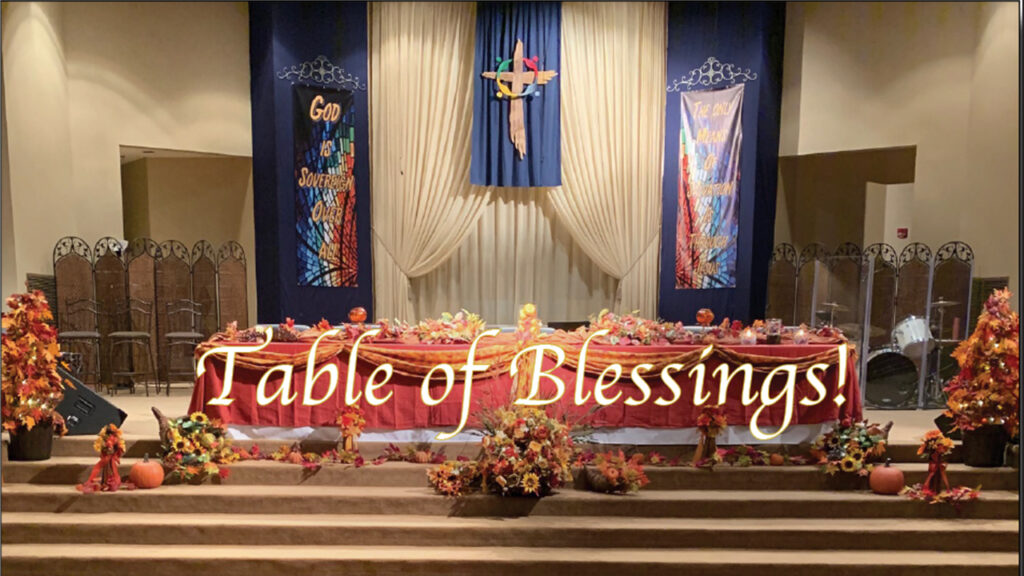
Table of Blessings! 2022
Posted on Nov 20, 2022 by Ken Durham in General, Special Message |

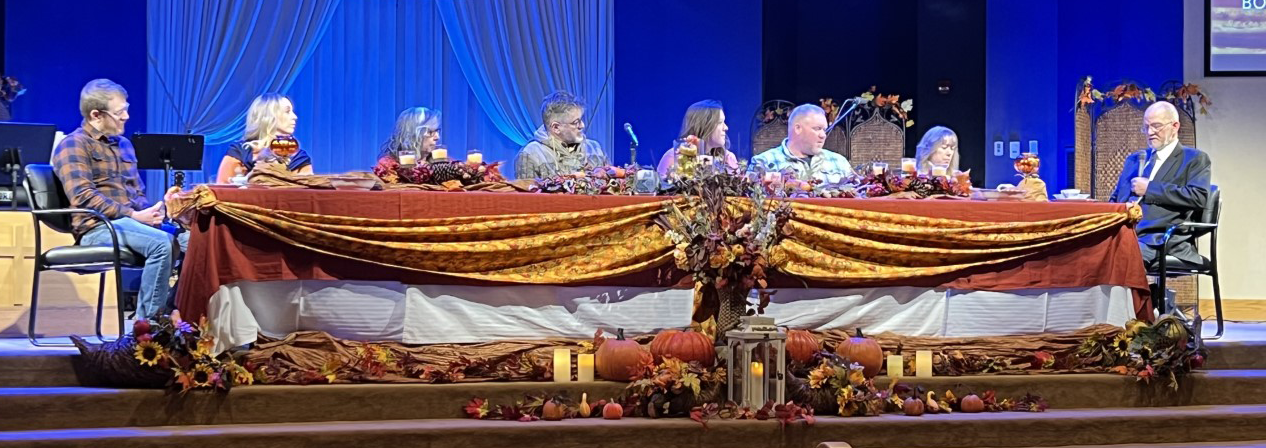
Shout joyfully to the Lord, all the earth.
Serve the Lord with gladness;
Come before Him with joyful singing.
Know that the Lord Himself is God;
It is He who has made us, and not we ourselves;
We are His people and the sheep of His pasture.
Enter His gates with thanksgiving
And His courts with praise.
Give thanks to Him, bless His name.
For the Lord is good;
His lovingkindness is everlasting
And His faithfulness to all generations.
You can listen to this service by clicking below:
You can watch this service by clicking HERE.
Read more...
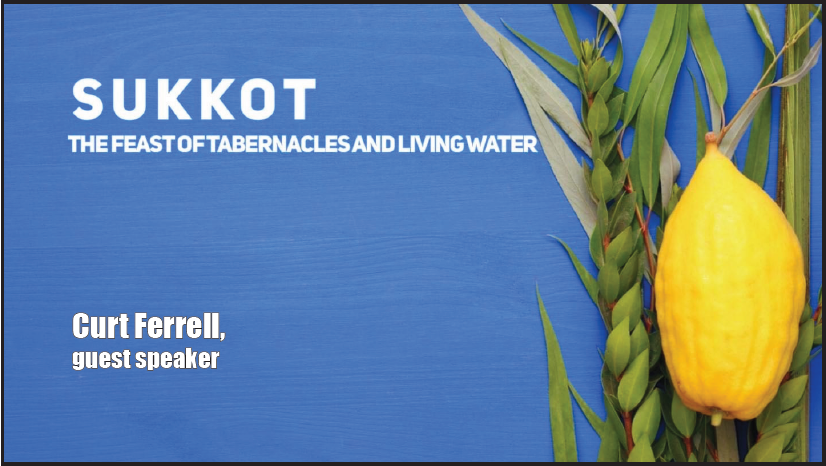
Sukkot: The Feast of Tabernacles & Living Water
Posted on Oct 9, 2022 by Curtis Ferrell in General, Sermon Notes, Special Message |

Sukkot: The Feast of Tabernacles and Living Water
Introduction
This year we’ve been looking at the three Pilgrimage Feasts that God commanded to be celebrated every year by the people of Israel – Passover, Pentecost, and the Feast of Tabernacles.
For the sake of time, we are not going to spend a lot of time recapping the first two Feasts – Passover and Pentecost (sometimes called the Feast of Weeks). You can go back in the recordings on the web page or Facebook or YouTube and look at those again. We even have a Podcast now!
What I WILL say is that we saw that Passover had three components. First, what it meant historically (what God wanted them to remember during the feast). Second, it had what it meant in the “Now” (what difference did it make in the life of the people of God). Third, it had the “Not Yet” component (what is still left that will happen in the future).
Pentecost, sometimes called the Feast of Weeks, has three components – the Historical, the “Now,” and the “Not Yet.”
These first two Pilgrimage feasts that God ordained (hundreds of years earlier) to be celebrated for all time – became the two biggest days in the life of the Church.
It only makes sense that the third Pilgrimage Feast would be the next great day in the life of the church. And if the pattern continues there will be three components to the Feast of Tabernacles – The Historical component, the “Now” component, and the “Not Yet” component.
So, the more we know about the historical component of the Feast of Tabernacles, and how and why the Jews celebrate this third feast, the more likely we will be able to recognize the third great day in the life of the church when it occurs.
The Historical Component of the Feast of Tabernacles
Passover and Pentecost correlate to the two greatest days in the life of the church. But this third Feast, the Feast of Tabernacles, hasn’t yet had a corelating event in the life of the church. So, we’re going to have to make some educated guesses about the “Not Yet” part of the Feast of Tabernacles.
Since the Feast of Tabernacles is celebrated after the final harvest of the year, the “Not Yet” component will be celebrated after the final harvest of souls. Since it was celebrated after Israel entered the Promised Land, we will celebrate it after the Day of Judgement when we have entered into the Promised New Heaven and New Earth. And since it is a celebration of God’s Protection and Provision during Israel’s wandering in the desert, it will be the greatest feast in the life of the church celebrating God’s protection and provision during our earthly lives. Some would say that this is the prophesied “Marriage Supper of the Lamb” found in Revelation 19:6-9.
It hasn’t happened yet, but I think the typology and parallels are so aligned that this is clearly the “Not Yet” component of the Feast of Tabernacles.
The third great day in the life of the church will be after the final harvest of souls, and after the Day of Judgment, when we enter the Promised New Heaven and New Earth (The Kingdom of God). It will be the greatest celebration in the life of the church.
So, we know the Historical component of the Feast of Tabernacles. And we’re pretty sure we know the “Not Yet” component of The Feast of Tabernacles. But what about the “Now” component? Passover had all three: the historical, “Now,” and “Not Yet.” Pentecost had the historical, “Now,” and “Not Yet.” The Feast of Tabernacles should have an historical, a “Now,” and a “Not Yet.”
As we look at scripture, we see how and when The Feast of Tabernacles was celebrated, and a theme appears that highlights the “Now” portion of The Feast of Tabernacles.
Where does Scripture talk about the Feast of Tabernacles?
There are four places where we see God’s command to celebrate the Feast of Tabernacles and they all say pretty much the same thing (Exodus 23:14-17; Exodus 34:18-24; Deuteronomy 16:13-17; Leviticus 23:39-43). Let’s look at Leviticus 23.
Leviticus 23:39-43 –
“On the fifteenth day of the seventh month, when you have gathered in the produce of the land, you shall celebrate the feast of the LORD seven days. On the first day shall be a solemn rest, and on the eighth day shall be a solemn rest. And you shall take on the first day the fruit of splendid trees, branches of palm trees and boughs of leafy trees and willows of the brook, and you shall rejoice before the LORD your God seven days. You shall celebrate it as a feast to the LORD for seven days in the year. It is a statute forever throughout your generations; you shall celebrate it in the seventh month. You shall dwell in booths for seven days. All native Israelites shall dwell in booths, that your generations may know that I made the people of Israel dwell in booths when I brought them out of the land of Egypt: I am the LORD your God.”
But there are other places in Scripture that also talk about the Feast of Tabernacles that are kind of interesting.
Let’s look at when Solomon built the first temple. You can find the story in 1 Kings 8 and 2 Chronicles 5-7.
Then Solomon sacrifices thousands of oxen and sheep to God. The musicians sing songs of worship accompanied by all kinds of instruments. There were so many sacrifices that they had to consecrate a large part of the middle court of the Temple because the normal altar was too small to contain them.
2 Chronicles 7:8-10 –
At that time Solomon held the feast for seven days, and all Israel with him, a very great assembly, from Lebo-hamath to the Brook of Egypt [from the North to the South.] And on the eighth day they held a solemn assembly, for they had kept the dedication of the altar seven days and the feast [of Tabernacles] seven days. On the twenty-third day of the seventh month he sent the people away to their homes, joyful and glad of heart for the prosperity that the LORD had granted to David and to Solomon and to Israel his people.
In this story we see that Solomon built the temple, and inside it he placed the Ark of the Covenant and all the utensils for worship. Then the Glory of the Presence of the Lord filled the temple and was so intense that the priests physically could not enter the temple. They spent seven days celebrating and dedicating the altar to God, and then spent another eight days celebrating the Feast of Tabernacles.
They dedicate the altar, the Spirit of God shows up, and then they celebrate the Feast of Tabernacles.
Fast forward to after the Kingdom is divided – North and South; the northern ten tribes of Israel are sent into exile by Assyria and about 125 years later the southern two tribes of Judah are sent into exile by Babylon. Near the end of the 70-year exile to Babylon we see that the Israelites were given permission to return to Jerusalem and rebuild the altar of the Lord that had been destroyed. They begin offering sacrifices to God again.
Ezra 3:1-6 –
When the seventh month came, … they built the altar of the God of Israel, to offer burnt offerings on it, as it is written in the Law of Moses the man of God. They set the altar in its place, for fear was on them because of the peoples of the lands, and they offered burnt offerings on it to the LORD, burnt offerings morning and evening. And they kept the Feast of Booths, as it is written, and offered the daily burnt offerings by number according to the rule, as each day required, … From the first day of the seventh month they began to offer burnt offerings to the LORD. But the foundation of the temple of the LORD was not yet laid.
So, this was after the altar had been rebuilt, but before the Temple was rebuilt. At the end of exile, once they restored the worship of God, they immediately celebrated the Feast of Tabernacles. In Nehemiah we see that after they rebuilt the Temple the same thing happens.
Nehemiah 8:13-18 –
On the second day the heads of fathers’ houses of all the people, with the priests and the Levites, came together to Ezra the scribe in order to study the words of the Law. And they found it written in the Law that the LORD had commanded by Moses that the people of Israel should dwell in booths during the feast of the seventh month, and that they should proclaim it and publish it in all their towns and in Jerusalem, “Go out to the hills and bring branches of olive, wild olive, myrtle, palm, and other leafy trees to make booths, as it is written.” So the people went out and brought them and made booths for themselves, each on his roof, and in their courts and in the courts of the house of God, and in the square at the Water Gate and in the square at the Gate of Ephraim. And all the assembly of those who had returned from the captivity made booths and lived in the booths, for from the days of Jeshua the son of Nun to that day the people of Israel had not done so. And there was very great rejoicing. 18 And day by day, from the first day to the last day, he read from the Book of the Law of God. They kept the feast seven days, and on the eighth day there was a solemn assembly, according to the rule.
Can you see the pattern? Solomon builds and dedicates the Temple, the Presence of God fills the Temple, and they celebrate the Feast of Tabernacles. In Ezra we see that as the exile is ending, they rebuild the altar, reestablish the worship of God, and they celebrate the Feast of Tabernacles. After the Temple was rebuilt, the people of God gather for the celebration of the Feast of Tabernacles.
In all three instances, after the place of worship is built, true worship is reestablished, and the celebration of the Feast of Tabernacles is observed.
In John 7, Jesus extends and enhances this pattern during the Feast of Tabernacles.
What Did Jesus Mean?
John 7:37-39 –
On the last day of the feast, the great day (the eighth day), Jesus stood up and cried out, “If anyone thirsts, let him come to me and drink. Whoever believes in me, as the Scripture has said, ‘Out of his heart will flow rivers of living water.’” Now this he said about the Spirit, whom those who believed in him were to receive, for as yet the Spirit had not been given, because Jesus was not yet glorified.
On its face this statement by Jesus seems weird. They’ve been partying for seven days. It is now the eighth day of eating and drinking and Jesus says, “Hey, if anyone is thirsty, come and drink this living water.” Who’s thirsty after seven days of partying?
Now John knows that Jesus’ invitation didn’t make sense – not because it was wrong, but because Jesus had packed a lot of information into one question. Jesus had just connected several dots that would only make sense after his death, and after Pentecost. So, later as John was writing his gospel account, he added this parenthetical statement in verse 39: “Now this [Jesus] said about the Spirit, whom those who believed in him were to receive, for as yet the Spirit had not been given.”
So, if Jesus was talking about the Spirit of God (like John says) what happened when the Spirit was finally given to the church?
What do we know about the Spirit of God?
But in the NT, Paul and Peter declare (at least five times) that the people of God have become the temple of God (1 Corinthians 3:16-17; 6:19-20; 2 Corinthians 6:14-18; Ephesians 2:19-22; 1 Peter 2:4-5). They become temples of God in Acts 2 where we see tongues of fire and the sound of a rushing wind representing the Presence of God come to rest on his people.
Before we go further, we need to understand that in the Jewish mind, the words temple and tabernacle were almost interchangeable. Before the temple was built, the tabernacle was the place where the Spirit of God resided. When the temple was built, the tabernacle was moved into the temple and the temple was the place where the Spirit of God resided. Because the words temple and tabernacle were interchangeable, we’re going to proceed with the understanding that, after Pentecost, Paul and Peter understood the people of God to be the tabernacle of God – the place where the Spirit of God resided.
But what does the Presence of the Spirit of God have to do with Living Water, and the Feast of Tabernacles?
I think the whole book of Ezekiel explains it. Ezekiel has a series of prophetic visions about the Glory of the Presence of the Spirit of God leaving the temple – really leaving the entire city of Jerusalem. And then, after returning, a new vision declares what happens when the Spirit of God returns. We don’t have time to read the entire book of Ezekiel this morning, but I would encourage you to take time and read through it on your own. But for today, let me condense it.
In the first eight chapters of Ezekiel we read about several unique moments where Ezekiel encounters the “likeness of the Glory of the Lord” and “the Spirit enters into” him.
In chapters 9 and 10, Ezekiel sees the physical “Glory of the God of Israel” move from its place above the Ark of the Covenant inside the Holy of Holies to the doorway of the Temple.
In chapter 11 Ezekiel “sees the Glory of the God of Israel” move from the threshold of the temple. It then leaves the city and rests on the mountain that is east of Jerusalem – the Mount of Olives. In Ezekiel’s vision the Glory of the Spirit of God left, not only the temple but, the entire city of Jerusalem.
In the following chapters, Ezekiel hears God pronounce several prophecies of judgment and destruction. He hears God declare the destruction of Judah, Jerusalem, and its leaders as well as Israel’s enemies and the destruction of the Temple itself.
Then there’s a pivot point, where God says in Ezekiel 36:27: “I will put my Spirit within you, [kind of sounds like Acts 2] and cause you to walk in my statutes and be careful to obey my rules.” And God promises to restore Israel and that he will, “Pour out [His] Spirit upon the house of Israel” (Ezekiel 39:29).
Finally, God shows Ezekiel that his Spirit will return to the Temple in Ezekiel 43.
And after giving further instructions for the operation of the Temple, in chapter 45, God commands a celebration of the Passover, but he also promises a Prince who will provide a sacrifice for the people of God during Passover. And God promises that this Prince will also make provision for the celebration of the Feast of Tabernacles. I wonder who that Prince might be? Then we see what happens now that the Presence of the Lord has returned to the Temple.
Ezekiel 47:1–12 –
Then he brought me back to the door of the temple, and behold, water was issuing from below the threshold of the temple toward the east (for the temple faced east). The water was flowing down from below the south end of the threshold of the temple, south of the altar. Then he brought me out by way of the north gate and led me around on the outside to the outer gate that faces toward the east; and behold, the water was trickling out on the south side.
Going on eastward with a measuring line in his hand, the man measured a thousand cubits, and then led me through the water, and it was ankle-deep. Again he measured a thousand, and led me through the water, and it was knee-deep. Again he measured a thousand, and led me through the water, and it was waist-deep. Again he measured a thousand, and it was a river that I could not pass through, for the water had risen. It was deep enough to swim in, a river that could not be passed through. And he said to me, “Son of man, have you seen this?”
Then he led me back to the bank of the river. As I went back, I saw on the bank of the river very many trees on the one side and on the other. And he said to me, “This water flows toward the eastern region and goes down into the Arabah [a desert wasteland], and enters the [Dead] sea; when the water flows into the sea, the water will become fresh. And wherever the river goes, every living creature that swarms will live, and there will be very many fish. For this water goes there, that the waters of the sea may become fresh; so everything will live where the river goes. Fishermen will stand beside the sea. From Engedi to Eneglaim [the western shore of the Dead Sea] it will be a place for the spreading of nets. Its fish will be of very many kinds, like the fish of the Great Sea [the Mediterranean]. But its swamps and marshes will not become fresh; they are to be left for salt. And on the banks, on both sides of the river, there will grow all kinds of trees for food. Their leaves will not wither, nor their fruit fail, but they will bear fresh fruit every month, because the water for them flows from the sanctuary. Their fruit will be for food, and their leaves for healing.”
Where have we heard this language before? About a river of life flowing and the trees on its banks producing fruit year-round?
This same river of Living Water is talked about in Revelation 22:1-2:
Then the angel showed me the river of the water of life, bright as crystal, flowing from the throne of God and of the Lamb through the middle of the street of the city; also, on either side of the river, the tree of life with its twelve kinds of fruit, yielding its fruit each month. The leaves of the tree were for the healing of the nations.
Over and over in Scripture we see that the Presence of the Spirit of God is associated with living water (Isaiah 43:16-21; Zechariah 14; and Revelation 22).
Story Problem: Living Water and the Tree of Life
Now, for years I had a faulty story running around in my head about Living Water, and also about the Tree of Life that we find in the Garden in Eden.
I used to think that the Tree of Life and the Tree of the Knowledge of Good and Evil were infused with some kind of “magical power.” One bite from the poisonous apple and you are doomed. I used to believe, one bite from the Tree of Life and you will become immortal. I used to think that the springs of Living Water are flowing from Jesus in order to give us eternal life.
We get these images from fables like Snow White, and Ponce de León’s Fountain of Youth, and from misreading scripture.
Death was decreed in the Garden, not because the fruit of the Tree of the Knowledge of Good and Evil contained fatal magic, but because Adam and Eve disobeyed God. Instead, they obeyed a created being – someone they were designed and commissioned to have dominion over.
The Tree of Life did not contain a “one-and-done” gift of eternal life. Just like any other fruit tree, as long as it bears fruit, and as long as you keep eating the fruit, you get the benefits of the taste and enjoyment of the fruit. When mankind was expelled from the Garden, we lost access to the Tree of Life, and could no longer enjoy the benefits of its fruit – which is Life.
And the rivers of Living Water that Jesus was talking about in John 7 are not just flowing from Jesus for our benefit – they are flowing from Jesus, THROUGH US, for the benefit of the world around us!
Every farmer or explorer knows that where there is a spring of water there will be life, and growth, and fruitfulness. If you are ever in a plane sit by a window seat and look for the clumps or row of trees on the ground beneath you. You know that everywhere you see that kind of growth, there is a source of living water.
The same is true of every child of God in whom dwells the Presence of the Spirit of God. Your very presence should bring life and fruitfulness to everyone you meet, every place you go, and every situation you encounter. Living Water will always flow from the Presence of the Holy Spirit.
This is the “Now” component of the Feast of Tabernacles.
This is the “Now” component of the Feast of Tabernacles. The people of God have become the new “tabernacles” of God. The Spirit of God lives inside us. And streams of Living Water flow from these new tabernacles.
As we celebrate God’s Protection and Provision over the Israelites during their 40-year wandering – as we celebrate God providing for and protecting us in our day-to-day life – we need to acknowledge the natural outworking of the Presence of the Spirit of God in our lives.
We are the portable tabernacles of the Presence of God. We are designed to have springs of Living Water flowing from our lives to the world around us. And you say, “Curt, what does that look like?”
Scripture tells us that, “everything will live where this river goes. … On the banks, on both sides of the river, there will grow all kinds of trees for food. Their leaves will not wither, and their fruit will not fail. They will continually bear fresh fruit because the water for them flows from these tabernacles. Their fruit will be for food, and their leaves for healing.”
That is what Jesus was excited about in John 7. These new tabernacles of God – his Post-Pentecost people – would become sources of Living Water. During our wandering in the world before the final harvest of souls and the day of Judgment, the people of God should be transforming lives with the Living Water of the Spirit of God.
We exist to transform dry, barren, and dying stories through the gospel of Jesus Christ by the power of the Holy Spirit. We desire to see communities thriving and full of life, and fruitfulness, and nourishment, and healing to the glory of God.
Everywhere the Living Water flows, the Spirit of God will bring life, and fruitfulness, and nourishment, and healing. That’s the “Now” of the Feast of Tabernacles.
The Reason for the “Now” of the Feast of Tabernacles
For the child of God, being passive in the face of the Second Coming of Christ is not an option. We need to be proactive sources of Living Water bringing life, and healing, and nourishment, and restoration, and fruitfulness everywhere we place our feet.
You and I are God’s stewards. His grace should extend through us to those who are still wandering. Our hope and expectation is that they too will join us in the great feast after the Second Coming of Christ. We can provide the life-giving waters that bless, and nourish, and heal them until they make a decision to follow Christ and become new sources of Living Water to those in their lives.
There’s work to be done! You and I are tabernacles of the Presence of the Spirit of God. Look around you. Where are the dry, barren, fruitless places in our community and in our families. How can you, through the power of the Holy Spirit, transform those stories into life-giving, fruitful places of healing by allowing the Living Water to flow through your life? What could that look like in your life? Imagine the possibilities!
The Seventh Year
Before we close, I want to share one more thought with you. This is for those who have not yet accepted Christ. This year the Feast of Tabernacles starts when the sun goes down tonight. I found out a couple of weeks ago that this year’s Feast of Tabernacles is special.
This year 2021-2022 is a sabbath year, a year of release.
So, in the sabbath year, the year of release, as the people of God were celebrating the fact that God had provided for them for the forty years they wandered in the desert, they were experiencing the blessing of the harvest in the sixth year. That harvest was so large that it provided for their needs during the seventh year. As they were celebrating this provision, they were preparing for the forgiveness of their debts and delivery from slavery. At the end of the Feast of Tabernacles they would be starting over. Fresh. Free. Forgiven.
The Appeal
Today you can have your debts forgiven. You can be delivered from whatever enslaves you. You can start over with a clean slate. Whether you recognize it or not, you’ve been living on the abundant provision of God. You’ve been beneficiaries of the Living Water as you’ve wandered.
Christian, you are a source of the Living Water provided by the Holy Spirit. That Living Water will provide nourishment, healing, and life to the people you encounter every day – but it must be shared. Let the Living Water flow!
You can listen to the message by clicking below:
You can watch the message by clicking HERE.
Read more...
